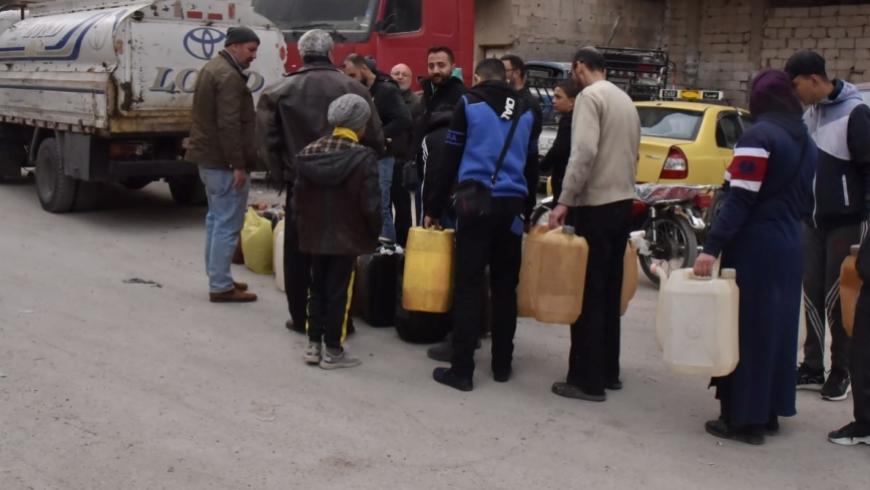Many owners of sweets bakeries and private bakeries in Damascus are forced to close their factories due to the fuel crisis and the rise in fuel prices on the black market. This comes amid an almost complete power outage, which caused large numbers of workers to be laid off.
The newspaper Al-Watan, close to the government, quoted one of the owners of the closed bakeries confirming that he closed his bakery for several reasons, including the exaggerated rise in fuel prices on the black market. He also accused the internal trade and consumer protection patrols of bakery owners of trading in subsidized materials if there are quantities of diesel other than the quantities distributed by a fuel company.
Great distress
For his part, the former head of the Craft Association for the Confectionery Industry, Mohammed Bassam Kalaaji, told Al-Watan that “all the owners of private bakeries and workshops are going through great distress. A fuel company previously distributed to them quantities sufficient to work for only 5 hours a day, and then the company only distributed what allows them to work for only two hours.
He continued: “The craftsman now works 60 hours a month, and this does not allow the employer to give wages to his workers or to support his small family. All bakeries and large shops have turned into very small workshops that work in a way that covers the needs of the market at a minimum.”
Since the beginning of December, the fuel company has not distributed any liter to bakeries, whether confectionery factories or private bread bakeries, he said.
“Private bakeries cannot continue under the current circumstances, as most of their owners have laid off their workers and stopped working because the employer can withstand only one or two weeks and not permanently, especially since we have reached the peak of the fuel crisis,” Kalaaji said.
For about two years, the areas controlled by the Syrian regime have been witnessing a severe fuel crisis, (gasoline, gas, and diesel), which caused strict measures imposed by the regime government to ration these materials, remove subsidies and reduce allocations. This coincides with the impact of the Russian invasion of Ukraine on Russian and Iranian supplies to Syria, especially with the Western sanctions imposed on the regime.
Molasses and cinnamon are alternatives to heating in Syria
On the other hand, the pro-government website Athr Press quoted one of the teachers as saying that she is using blankets, aid blankets and thick jackets as alternatives to heating this year in order to get through the cold days.
The teacher added that she “cannot get only one means of heating, as diesel is almost missing, electricity is not obtained for more than an hour compared to six hours of outage. As for gas, every 150 days we get a cylinder.”
The cost of heating diesel for the family is three million Syrian pounds
Sociologist Amani Amdar points out that the solutions that Syrians are seeking to get warm amid the sharp decline in fuel allocations and the monopoly of firewood by traders raise the cost of heating.
According to Amdar, the family needs three million Syrian pounds for heating during the winter, especially families with children, the elderly and people with chronic diseases, who cannot afford other types of heating.
With the onset of winter, the fuel crisis increased in Damascus and the rest of the governorates under the control of the regime, as it paralyzed the movement of transportation and public transport, especially in the capital and its suburbs, in addition to the ongoing service and living crises without any significant improvement.
Electricity
Daily rationing hours exceeded 21 to 23 hours, while some areas did not have access to electricity for more than a day.
With the government’s inability to secure diesel and gasoline, the government approved an official holiday on Sunday, December 11 and 18, due to the worsening fuel crisis and the suspension of transportation.
Iran aids regime with oil tanker
An Iranian oil tanker arrived on the coast of Baniyas days after the intensification of the fuel crisis in areas controlled by the Syrian regime.
Through satellite images and ship-tracking site data, Syria TV monitored the berthing of the tanker (SIRVAN SABOU), which has a load of about one million barrels.
According to the website Marine Traffic, the ship crossed the Egyptian Suez Canal on the fifth of December. Satellite images obtained by Syria TV show the ship off Baniyas on the 11th of December.
According to the United Against Iran group, which records Iranian oil exports, the regime received about 47,000 barrels per day of Iranian oil in November, less than half of the amount it received in October and September.


